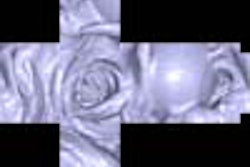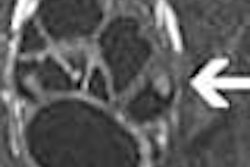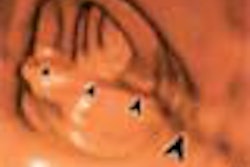Dear AuntMinnie Insider,
As radiologists perfect their methods of performing and interpreting virtual colonoscopy, technical researchers are finding new ways to make the process easier. Today's Insider highlights the contributions of technical innovators on two continents.
First, Janne Näppi, Ph.D. and colleagues from the University of Chicago describe the addition of mass-detection capabilities to their existing computer-aided-detection scheme, which is based on the identification of polypoid shapes and textures.
Mass detection begins with fuzzy merging, a process that looks for suspicious density patterns in CT data to link voxels that may represent intraluminal colorectal masses. Some lesions do not protrude into the colonic lumen, of course, so the technique also includes a sophisticated method of measuring colonic wall thickening, again based on CT attenuation. In a cohort with 14 colonoscopy-proven colorectal masses, the system detected 13 lesions, missing only the one that had been cut off from the CT data. Click here to find out how they did it.
On the other side of the pond, investigators from the Academic Medical Center in Amsterdam have taken on the weighty issue of 2-D versus 3-D VC interpretation, concluding that the best answer may be "none of the above." Dr. Frans Vos and colleagues discuss their results with an unfolded cube display designed to speed up interpretation while maximizing the percentage of mucosal surface examined. According to results in 30 patients, the system did just that, though sensitivity and specificity did not improve dramatically compared with traditional methods. Click here for the details.
For the full story on virtual colonoscopy, however, there is no substitute for the Fourth International Symposium on Virtual Colonoscopy, being held October 13-15 in Boston. Sponsored by the Boston University School of Medicine, the world's preeminent VC meeting will feature interpretive insights, clinical findings, policy implications, and the latest technical developments in this emerging field. You'll find more information here.
See you in Boston!




















